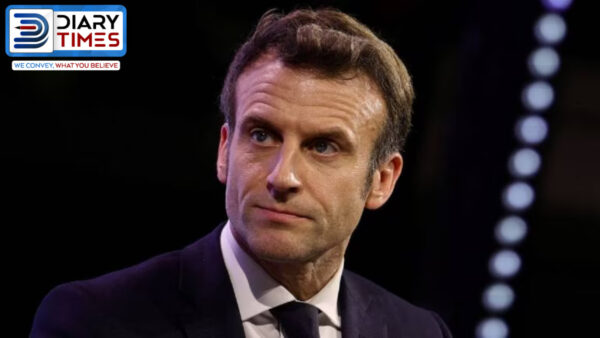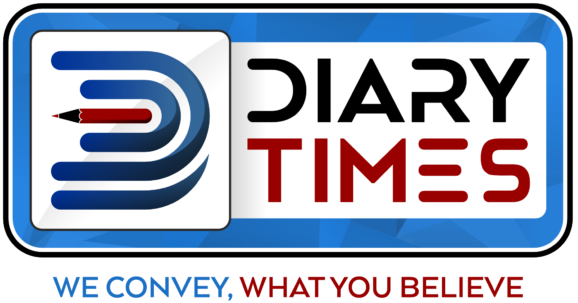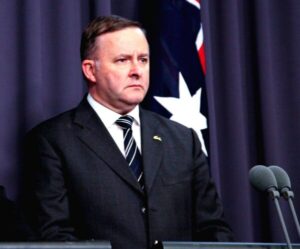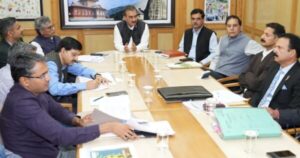Presidential Pivot: Macron Set for Prime-Time News Conference to Revitalize Leadership
In a strategic move, Macron is ushering in change with new faces and ideas, a pivot initiated more than three years before his term concludes. This follows the recent appointment of a centrist government, spearheaded by France’s youngest-ever prime minister, showcasing Macron’s commitment to rejuvenating his leadership approach and introducing dynamic perspectives into the political landscape.

Presidential Pivot: Macron Set for Prime-Time News Conference to Revitalize Leadership
Emmanuel Macron, the French President, is set to embark on a pivotal moment in his presidency as he gears up for his first prime-time news conference scheduled for Tuesday. This highly anticipated event serves as a platform for Macron to unveil his top priorities for the year ahead, signaling a strategic effort to breathe new life into his administration. In a notable declaration, Macron emphasizes his commitment to focusing on “results,” underlining a determination to deliver tangible outcomes despite the inherent challenges of not commanding a majority in the parliament. This announcement not only underscores Macron’s proactive approach but also positions the news conference as a crucial juncture for outlining a roadmap that navigates the intricacies of French politics while aligning with the President’s vision for a revitalized and effective leadership.
We’re now on WhatsApp –Click to join.
Emmanuel Macron, with over three years remaining in his presidential term, is orchestrating a strategic shift aimed at infusing vitality into his administration. This proactive move involves the introduction of new faces and innovative ideas into the political landscape, reflecting Macron’s commitment to adaptability and a forward-thinking governance approach. This significant transition comes in the aftermath of Macron’s recent formation of a new centrist government, an ensemble led by France’s youngest-ever prime minister. Macron’s deliberate choice of youthful leadership aligns with his vision for a rejuvenated political landscape, where fresh perspectives and dynamic strategies play a central role in addressing the evolving challenges of governance. This nuanced recalibration not only showcases Macron’s responsiveness to the changing political dynamics but also positions France on a trajectory toward potential transformation, both in terms of policy dynamics and the overall narrative of leadership.
As the spotlight turns to Tuesday evening, Emmanuel Macron is anticipated to unveil the pivotal objectives entrusted to the recently appointed Prime Minister, the widely popular 34-year-old Gabriel Attal, and the members of the Cabinet. This strategic move comes against the backdrop of escalating political challenges from the far-right, as Macron strives to fortify his legacy amid a shifting political landscape. The intricacies of Macron’s agenda gain prominence as the Constitution precludes him from seeking a third consecutive term in 2027, adding an additional layer of significance to his administration’s short-to-medium-term goals and the imprint he aims to leave on French politics.
In his New Year’s Eve address, Emmanuel Macron set the tone for his vision in 2024, articulating a desire for a year characterized by “effective results” and a resurgence of “French pride.” Against the backdrop of the upcoming Paris Olympics this summer, Macron’s emphasis on achievement and national pride aligns with his overarching goal of steering France toward a period of impactful and positive outcomes. This strategic narrative reflects Macron’s aspirations for a transformative year that not only celebrates sporting excellence but also underscores the broader theme of national accomplishment and resilience.
Recent opinion polls highlight pressing concerns among the French populace, with heightened apprehension about escalating prices, the strain on health and education systems, and growing security issues. The survey data underscores the multifaceted challenges that are currently at the forefront of public consciousness, providing valuable insights into the priorities that demand attention in the political landscape.
Macron’s recent government reshuffle follows the successful adoption of two significant laws last year. One pivotal legislation raised the retirement age from 62 to 64, while the other, focused on immigration, aims to bolster France’s capacity to expel foreigners deemed undesirable. This strategic overhaul aligns with Macron’s commitment to enact key reforms and addresses critical issues affecting retirement policies and immigration dynamics in the country.
The controversial immigration bill has faced criticism from opposition quarters, with some deeming it too right-leaning. Macron, navigating the delicate balance, found himself defending the legislation, emphasizing that it was not a triumph for the far-right. This nuanced response underscores the complexities surrounding the immigration policy landscape in France and Macron’s strategic positioning to address diverse concerns while maintaining a centrist stance.
Despite recent reforms, Macron’s government confronts a significant hurdle: lacking a parliamentary majority, it must navigate law passage through negotiations with opposition lawmakers and leveraging special constitutional powers. This underscores the intricate dynamics at play in French politics, necessitating strategic alliances and adept maneuvering to advance legislative agendas in the absence of a clear majority.
In addition to other commitments, Macron pledges to restore France to full employment by the end of his term. While the unemployment rate saw improvement from over 10% in 2017 to about 7% last year, recent trends indicate a rise once again, presenting a formidable challenge to Macron’s ambitious employment goals. This underscores the intricacies of economic recovery and job market dynamics that the French administration grapples with amid shifting conditions.
The upcoming EU elections in June pose a significant challenge for the French president, a steadfast advocate for the European Union. Negotiating the intricacies of European politics, Macron faces the task of navigating these elections, which carry substantial implications for the future of the EU and his vision of a united and cohesive Europe.
Highlighting the pivotal role of the upcoming European elections, political experts Léonie Allard and Maris Jourdain assert, “These elections are key to providing EU institutions with the tools, dynamics, and legitimacy needed to tackle the challenges ahead.” This insight, shared in their analysis for the Atlantic Council think tank, underscores the significance of the electoral process in shaping the future trajectory of the European Union.
“A success in European elections is important for Macron at home, too. In 2019, elections in France brought the extreme right-wing National Rally into the European Parliament. It would be a major domestic setback for Macron to govern France with his party poorly represented in the Parliament,” they said.
Macron’s engagement with wide-ranging news conferences at the Elysee Palace has been sparse, and notably, none have taken place in the evening – a deliberate timing choice aimed at maximizing viewership. The upcoming Tuesday event marks a departure from this trend and will be broadcast live on various national television channels, showcasing Macron’s strategic approach to communicate directly with the public during a prime-time slot. This shift in timing reflects a conscious effort to ensure a more extensive reach and impact for the President’s message.
Controversies over newly appointed ministers have cast a shadow on the initial days of the new government, adding a layer of complexity to Macron’s recent cabinet reshuffle.
The selection of Rachida Dati as the culture minister, hailing from The Republicans conservative party, sparked intense criticism. Dati’s past legal entanglements, including preliminary corruption-related charges in 2021 over consulting fees from the Renault-Nissan alliance, added fuel to the controversy surrounding her appointment.
In adherence to French law, preliminary charges signify that magistrates have substantial grounds to suspect wrongdoing but necessitate further investigation before determining whether a case should proceed to trial. This legal nuance underscores the cautious approach taken in assessing potential legal ramifications tied to individuals like Rachida Dati, the recently appointed culture minister.
Macron’s office contends that Rachida Dati, despite facing preliminary charges, deserves the presumption of innocence – a stance emphasizing the importance of fair legal processes in the face of controversies surrounding her appointment as culture minister.
A fresh controversy unfolded as the new education minister, Amélie Oudéa-Castéra, sparked debate by expressing a preference for sending her children to a private Catholic school in Paris. She highlighted concerns about public school teachers going on leave without adequate replacements, injecting a contentious perspective into the discourse surrounding education policies in France.
The following day, Amélie Oudéa-Castéra issued an apology, recognizing that her remarks had inadvertently offended some teachers. This swift response reflects an acknowledgment of the sensitivity surrounding education issues and an attempt to address concerns raised by her initial statement.
Amidst the comments, a swift debate ensued on the privileges of French elites in contrast to the majority, whose children attend public schools grappling with shortages in both human and financial resources. The incident stirred broader discussions about societal disparities and access to quality education.

Continuing the achievement of the journey of effectiveness and credibility of more than 10 years in the career of journalism, as a woman journalist, I am Serving as the founder, promoter and editor of DiaryTimes with the trust and support of all. My credible coverage may not have given a big shape to the numbers, but my journey presents articles that make you aware of the exact and meaningful situations of Himachal’s politics, ground issues related to the public, business, tourism and the difficult geographical conditions of the state and financial awareness. DiaryTimes, full of the experience of my precise editorial expertise, is awakening the flame of credible journalism among all of you, so that the eternal flame of meaningful change can be lit in the life of the people of the state and the atrocities being committed against the people can be brought to the fore, I am motivated for that. If even a small change comes with the power of my journalism and the whole world becomes a witness to that issues, then I will consider myself fortunate.









